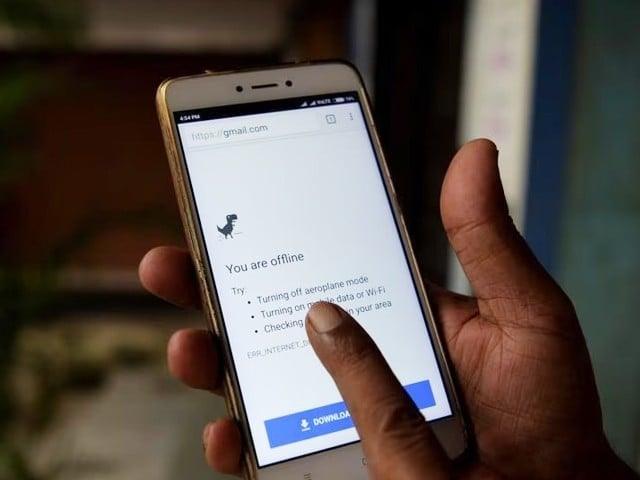The National Assembly Standing Committee on Information Technology has once again postponed the Pakistan Digital Nation Bill.
Sharmila Farooqi, a member of the committee, expressed anger over the government’s statements on lack of improvement in internet speed, Express News reported.
The committee meeting, chaired by federal IT minister Syed Aminul Haq, discussed various issues related to the bill and internet services.
The committee decided to defer the bill once again, with the chairman stating that the issue would be discussed in the next session, where inputs from members of the Pakistan People’s Party (PPP) and other parties would be considered.
Omar Ayub blames secret agencies behind Internet blackouts
Opposition leader Omar Ayub claimed that internet services are being shut down due to interference by secret agencies.
He said these shutdowns are causing millions of dollars in losses, and Pakistan still has one of the lowest internet speeds in the world.
Ayub further noted that despite earlier claims of improvement, internet speed remained unsatisfactory and demanded that PTA officials take oath to address these issues.
He also criticized the use of VPNs, saying the proposed models were being used as a weapon against the public.
He stressed that the problem was not with the VPN services but with the intentions behind their use.
Committee member Romina Khurshid Alam highlighted that monitoring is essential when there are threats against the state, citing how even cartoons are monitored in other countries.
He highlighted the committee’s role in strengthening the country and ensuring national security concerns are addressed.
Omar Ayub also questioned whether civilian surveillance is carried out under specific rules or court orders, noting that they all operate openly without any supervision, which he found worrying.
Internet shutdowns based on court, government and ministerial orders: PTA
Pakistan Telecommunication Authority (PTA) Chairman Hafeez-ur-Rehman took oath and reaffirmed his earlier statements regarding Pakistan’s Internet infrastructure.
He said: “I am in wudu (ablution) right now and I stand by my previous statement. In August 2024, I mentioned that out of 7 submarine cables, 4 were operational. In October 2024, one cable was repaired after a delay of 5 months , we rank 97th out of 200 countries in mobile service and we continually conduct surveys and review the situation.”
Hafeez-ur-Rehman further explained that the internet shutdowns are carried out as per instructions from the court, the federal government and the Ministry of Home Affairs.
“In the last six years we have earned Rs 1.7 trillion, but how much of that has been spent on infrastructure?” asked. He stressed: “When we receive instructions from the court, the government or the Ministry of Interior, we implement them. If I am doing something illegal, present the evidence and I will not return to the office from tomorrow.” He also pointed out that introducing submarine cables into Pakistan is the responsibility of the government, not the PTA. “In the last ten years no new cable has arrived,” he added.
Shaza Fatima Khawaja on security and surveillance
Responding to concerns over internet outages, Minister of State for IT Shaza Fatima Khawaja said the country’s security paradigm is undergoing a change due to the rise in terrorism.
“Terrorist incidents are increasing and we are facing internal security problems. If the Internet is cut off, where is the country’s growth supposed to come from?” she said.
He recognized the need for surveillance in certain areas, given current security challenges. “Terrorism occurs in this country and more than 100 soldiers are martyred in a month. I agree that unnecessary surveillance of the public is not acceptable, but we must carry out surveillance when necessary,” he said.
Shaza Fatima Khawaja, Minister of State for IT, assured the committee that Pakistan’s internet problems were now resolved, saying: “Pakistan has exported $1.5 billion in the last month. If the internet was shut down, where would this money come from? ?” He emphasized that the previous internet-related issues had been resolved, adding, “We are in talks with Starlink to bring satellite internet to Pakistan. No industry is facing internet issues now; the issues that existed have been addressed.”
Shaza Fatima also highlighted that the government was focusing on projects based on national priorities.
Sharmila Farooqi expresses frustration over lack of progress
Sharmila Farooqi of the People’s Party, visibly upset by the answers provided by Shaza Fatima, expressed her frustration saying: “I am very disappointed. Four meetings have been held and no solution has been found. Either we are lying or the government is lying.” We didn’t even talk about the damage; Pasha provides figures on the losses.”
He continued to question the frequent internet outages during the protests. “When the PTI calls for a protest, the Internet goes down immediately. Are we stupid? We drop everything and come to these committee meetings and they tell us everything is fine,” Farooqi said. He added that his WhatsApp and voice notes are not working properly, asking if only the government is telling the truth.
President Amin Ul Haq opposes VPN ban
Federal IT Minister Syed Amin Ul Haq opposed the ban on VPNs, stressing: “We oppose restrictions on VPNs. We need fast and uninterrupted Internet. We need to increase IT exports by 15 billion dollars, and VPNs should not be blocked if they are used legally.”
Committee calls for responsibility of the Ministry of the Interior
The committee demanded that the Home Office be held accountable for internet outages and slowdowns. Amin Ul Haq suggested calling President Pasha to explain the losses caused by slow Internet. Committee members agreed to summon Home Office officials to a closed-door session on internet disruptions.
Next steps and future meetings
The IT Committee also decided to summon Home Secretary, Law Secretary and Chairman Pasha in the next meeting to address VPN-related measures and the broader issue of internet disruptions in Pakistan.




